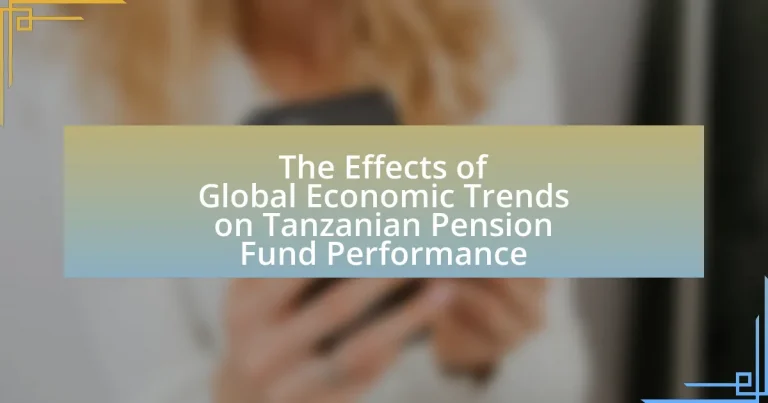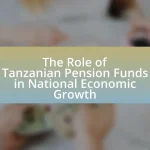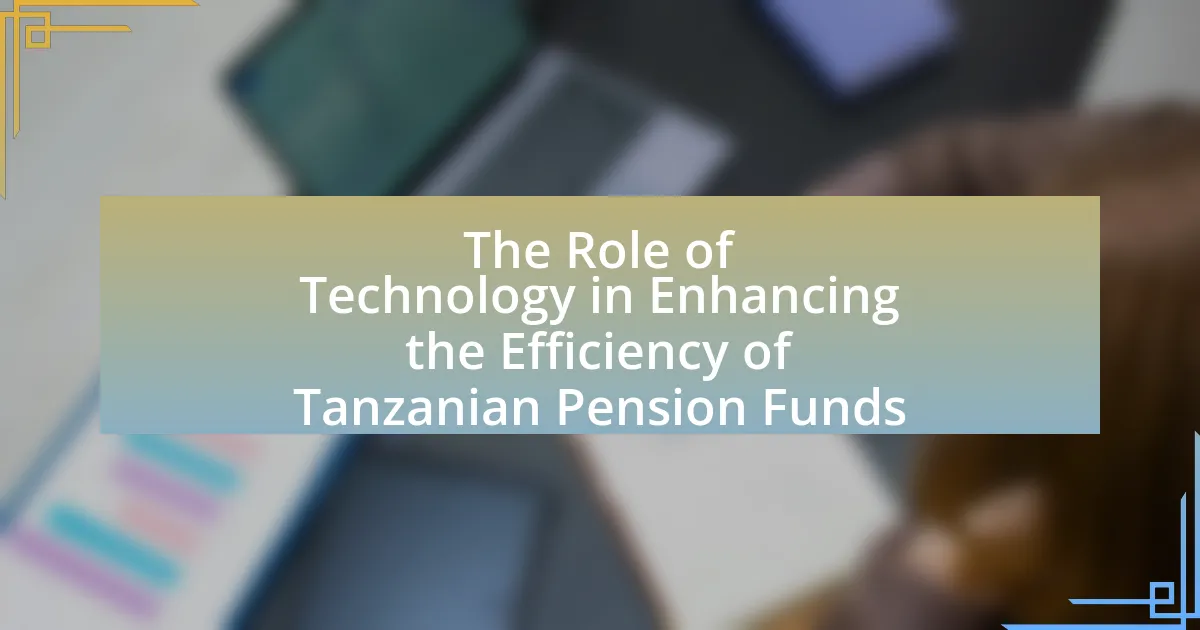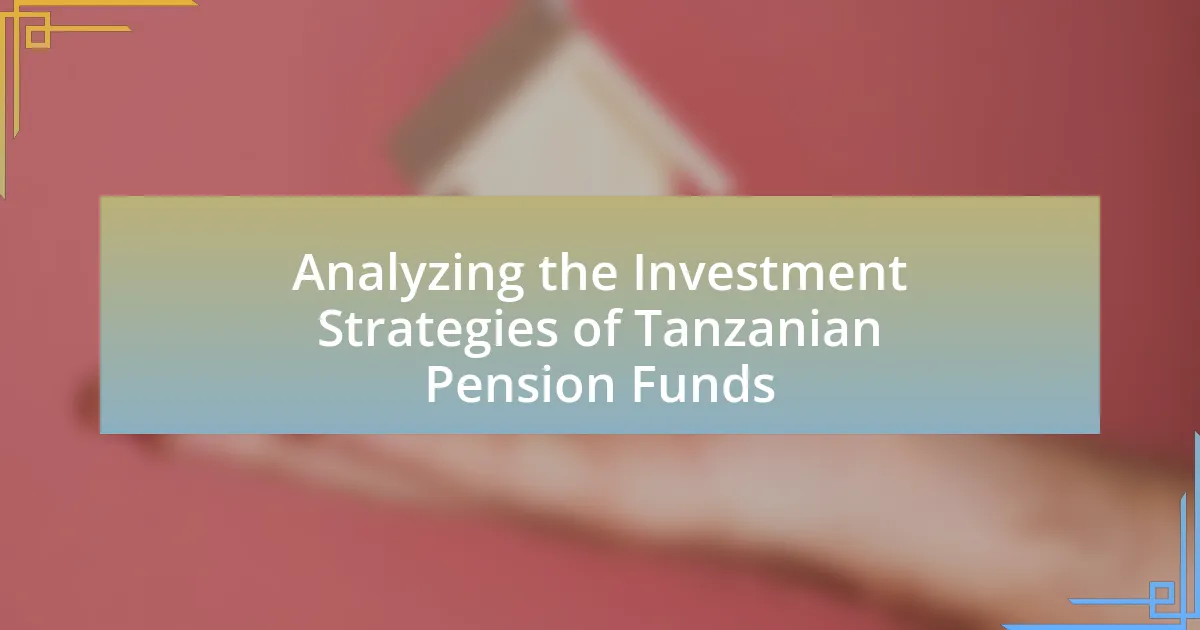The article examines the effects of global economic trends on Tanzanian pension fund performance, highlighting how fluctuations in interest rates, inflation, and market volatility influence investment strategies and asset valuations. It discusses the importance of monitoring key global economic indicators, such as GDP growth and currency exchange rates, which directly impact the financial stability of pension funds. Additionally, the article outlines strategies for risk mitigation, including diversification and active management, to enhance resilience against global economic changes. The implications of these trends for future pension fund policies in Tanzania are also addressed, emphasizing the need for regulatory reforms and adaptive investment approaches.
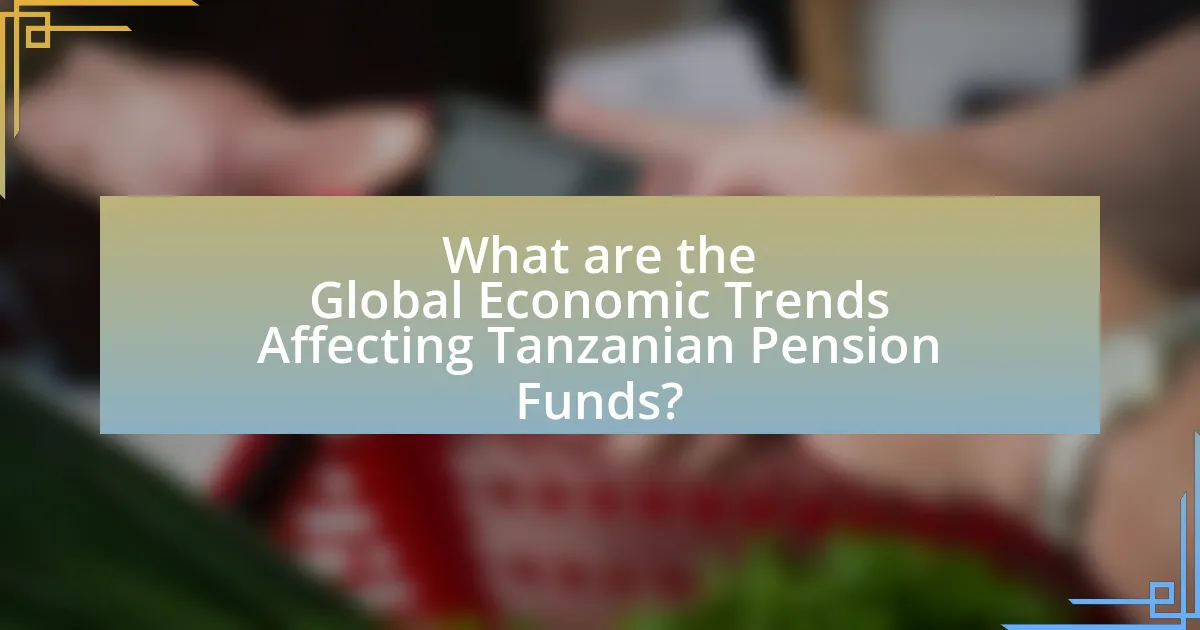
What are the Global Economic Trends Affecting Tanzanian Pension Funds?
Global economic trends significantly impact Tanzanian pension funds, primarily through fluctuations in interest rates, inflation, and global market volatility. For instance, rising interest rates in developed economies can lead to higher yields on government bonds, influencing the investment strategies of Tanzanian pension funds that seek stable returns. Additionally, inflationary pressures globally can erode the purchasing power of pension fund assets, necessitating adjustments in asset allocation to hedge against inflation. Furthermore, global market volatility, driven by geopolitical tensions or economic downturns, can affect the performance of equities and other investments held by these funds, leading to potential losses. These trends underscore the interconnectedness of Tanzanian pension funds with the global economic landscape, necessitating adaptive strategies to mitigate risks and optimize returns.
How do global market fluctuations impact pension fund investments in Tanzania?
Global market fluctuations significantly impact pension fund investments in Tanzania by affecting asset valuations and investment returns. For instance, when global markets experience downturns, the value of equities and bonds held by Tanzanian pension funds can decline, leading to reduced portfolio values and lower returns for beneficiaries. Additionally, fluctuations in foreign exchange rates can influence the purchasing power of pension funds that invest in international assets, further complicating their financial stability. According to the Bank of Tanzania, in 2020, the global economic slowdown due to the COVID-19 pandemic resulted in a 15% decrease in the value of pension fund assets, highlighting the vulnerability of these funds to external economic conditions.
What specific global economic indicators should Tanzanian pension funds monitor?
Tanzanian pension funds should monitor global economic indicators such as interest rates, inflation rates, exchange rates, and GDP growth rates. Interest rates influence the cost of borrowing and the return on investments, impacting pension fund performance. Inflation rates affect purchasing power and investment returns, making it crucial for funds to adjust their strategies accordingly. Exchange rates are vital for funds with international investments, as fluctuations can significantly affect asset values. Lastly, GDP growth rates provide insights into economic health, guiding investment decisions and risk assessments. Monitoring these indicators allows Tanzanian pension funds to make informed decisions that align with global economic trends.
How do currency exchange rates influence pension fund performance in Tanzania?
Currency exchange rates significantly influence pension fund performance in Tanzania by affecting the value of foreign investments and the purchasing power of returns. When the Tanzanian shilling depreciates against major currencies, the value of foreign assets held by pension funds increases in local currency terms, potentially enhancing overall fund performance. Conversely, if the shilling appreciates, the value of these foreign investments decreases, negatively impacting fund performance. For instance, fluctuations in exchange rates can lead to volatility in returns, as seen in 2020 when the Tanzanian shilling weakened against the US dollar, resulting in higher returns for pension funds with substantial foreign investments. This relationship underscores the importance of currency risk management in optimizing pension fund performance in Tanzania.
Why is understanding global economic trends crucial for Tanzanian pension funds?
Understanding global economic trends is crucial for Tanzanian pension funds because these trends directly influence investment returns and risk management strategies. For instance, fluctuations in global interest rates can affect the yields on bonds held by pension funds, while changes in commodity prices can impact the performance of equities in which these funds invest. Additionally, global economic conditions, such as recessions or growth periods, can alter the investment landscape, necessitating adjustments in asset allocation to safeguard the funds’ long-term sustainability. Therefore, by monitoring and analyzing these trends, Tanzanian pension funds can make informed decisions that enhance their financial stability and ensure they meet their obligations to beneficiaries.
What risks do global economic trends pose to pension fund stability?
Global economic trends pose significant risks to pension fund stability, primarily through market volatility, interest rate fluctuations, and inflation. Market volatility can lead to unpredictable asset valuations, impacting the investment returns that pension funds rely on to meet their obligations. For instance, during economic downturns, stock markets may decline sharply, reducing the value of equity holdings in pension portfolios.
Interest rate fluctuations affect the discount rates used to calculate the present value of future liabilities. When interest rates are low, pension funds may struggle to achieve the necessary returns on fixed-income investments, leading to funding shortfalls. According to the International Monetary Fund, low interest rates have persisted in many economies since the 2008 financial crisis, exacerbating this issue.
Inflation poses another risk by eroding the purchasing power of pension benefits over time. If pension funds do not adequately hedge against inflation, retirees may find their benefits insufficient to cover living expenses. The World Bank has noted that inflation rates in developing countries, including Tanzania, can be volatile, further complicating pension fund management.
These interconnected risks highlight the vulnerability of pension funds to global economic trends, necessitating robust risk management strategies to ensure long-term stability.
How can pension funds mitigate risks associated with global economic changes?
Pension funds can mitigate risks associated with global economic changes by diversifying their investment portfolios across various asset classes and geographic regions. This strategy reduces exposure to any single economic downturn, as different markets and sectors often respond differently to global economic shifts. For instance, during the 2008 financial crisis, pension funds that had diversified investments in equities, bonds, real estate, and alternative assets experienced less volatility compared to those heavily concentrated in domestic equities. Additionally, employing hedging strategies, such as using derivatives to protect against currency fluctuations and interest rate changes, further enhances risk management. Historical data shows that well-diversified pension funds can achieve more stable returns over time, thereby safeguarding beneficiaries’ interests against unpredictable global economic conditions.

What are the Specific Effects of Global Economic Trends on Tanzanian Pension Fund Performance?
Global economic trends significantly impact Tanzanian pension fund performance through factors such as interest rates, inflation, and investment returns. For instance, fluctuations in global interest rates can affect the yields on government bonds, which are a major investment for pension funds. When global interest rates rise, the value of existing bonds typically falls, leading to potential losses for pension funds. Additionally, global inflation trends can erode the purchasing power of pension fund assets, affecting long-term sustainability. Furthermore, the performance of global equity markets directly influences the returns on investments held by Tanzanian pension funds, as many funds diversify their portfolios internationally. For example, a downturn in major global stock markets can lead to reduced asset values and lower overall fund performance.
How do interest rate changes in developed economies affect Tanzanian pension funds?
Interest rate changes in developed economies significantly impact Tanzanian pension funds by influencing investment returns and capital flows. When interest rates rise in developed countries, it often leads to higher yields on government bonds and other fixed-income securities, prompting investors to shift their capital towards these markets for better returns. This shift can result in reduced investment in emerging markets like Tanzania, leading to lower capital availability for local pension funds. Additionally, higher interest rates can strengthen developed economies’ currencies, making Tanzanian assets less attractive to foreign investors, further constraining pension fund performance. Historical data shows that during periods of rising interest rates in the U.S. and Europe, emerging market funds, including those in Tanzania, have experienced capital outflows, negatively affecting their investment portfolios and overall returns.
What is the relationship between global interest rates and local investment returns?
Global interest rates inversely affect local investment returns, as higher global rates typically lead to increased borrowing costs and reduced capital inflows in local markets. For instance, when the U.S. Federal Reserve raises interest rates, it often results in a stronger dollar, making it more expensive for emerging markets, including Tanzania, to service foreign debt. Consequently, local investments may yield lower returns due to decreased economic activity and investor confidence. Historical data shows that during periods of rising global interest rates, such as from 2015 to 2018, many emerging markets experienced capital outflows, negatively impacting their local investment returns.
How can pension funds adapt their strategies in response to interest rate shifts?
Pension funds can adapt their strategies in response to interest rate shifts by diversifying their investment portfolios and adjusting their asset allocations. When interest rates rise, fixed-income investments typically lose value, prompting pension funds to increase their exposure to equities or alternative assets such as real estate or infrastructure, which may offer better returns. Conversely, in a declining interest rate environment, pension funds might shift back to bonds to lock in higher yields before rates fall further. Historical data shows that during the 2013 taper tantrum, many pension funds that diversified into equities saw better performance compared to those heavily invested in bonds, highlighting the importance of strategic asset allocation in response to interest rate changes.
What role does international trade play in the performance of Tanzanian pension funds?
International trade significantly influences the performance of Tanzanian pension funds by affecting investment opportunities and economic growth. Increased trade can lead to higher economic activity, which enhances the financial markets where pension funds invest. For instance, as Tanzania engages in trade, it can attract foreign direct investment, boosting local businesses and improving stock market performance. This correlation is evident in the 2020 World Bank report, which highlighted that countries with robust trade relationships often experience better economic indicators, positively impacting pension fund returns. Thus, the dynamics of international trade directly contribute to the overall performance and sustainability of Tanzanian pension funds.
How do trade agreements influence investment opportunities for pension funds?
Trade agreements significantly influence investment opportunities for pension funds by creating a more favorable environment for cross-border investments. These agreements often reduce tariffs and regulatory barriers, which can enhance the attractiveness of foreign markets for pension funds seeking diversification and higher returns. For instance, the African Continental Free Trade Area (AfCFTA) aims to increase intra-African trade, potentially opening up new investment avenues for Tanzanian pension funds in member countries. Additionally, trade agreements can stabilize economic relations, reducing risks associated with political and economic volatility, thereby encouraging pension funds to allocate capital in those regions.
What sectors benefit from international trade that could impact pension fund performance?
Sectors that benefit from international trade and could impact pension fund performance include manufacturing, agriculture, and technology. Manufacturing sectors often experience growth due to access to larger markets, which can lead to increased profits and higher returns for pension funds. For instance, Tanzania’s textile and garment industry has seen growth through exports, contributing positively to pension fund investments. Agriculture, particularly cash crops like coffee and tea, benefits from international demand, enhancing revenue streams for pension funds invested in this sector. The technology sector, driven by global partnerships and innovations, also presents opportunities for pension funds, as companies in this field often achieve rapid growth and high valuations. These sectors collectively influence the performance of pension funds by providing diversified investment opportunities and potential for higher returns.

What Strategies Can Tanzanian Pension Funds Employ to Navigate Global Economic Trends?
Tanzanian pension funds can employ diversification, active management, and strategic asset allocation to navigate global economic trends. Diversification across various asset classes, including equities, bonds, and alternative investments, helps mitigate risks associated with market volatility. Active management allows pension funds to respond swiftly to changing economic conditions, optimizing returns by adjusting portfolios based on market forecasts. Strategic asset allocation involves regularly reviewing and adjusting the mix of investments to align with both local and global economic indicators, ensuring that funds remain resilient against external shocks. For instance, during periods of global economic downturns, reallocating assets towards safer investments can protect fund performance.
How can diversification help Tanzanian pension funds manage global economic risks?
Diversification can help Tanzanian pension funds manage global economic risks by spreading investments across various asset classes and geographical regions, thereby reducing exposure to any single economic downturn. By investing in a mix of domestic and international equities, bonds, real estate, and alternative assets, pension funds can mitigate the impact of adverse global economic events, such as market volatility or currency fluctuations. Historical data shows that diversified portfolios tend to exhibit lower volatility and better risk-adjusted returns compared to concentrated investments, which is crucial for pension funds aiming to secure long-term benefits for their members. For instance, during the 2008 financial crisis, diversified funds experienced less severe losses than those heavily invested in specific sectors. This evidence underscores the importance of diversification as a strategic approach for Tanzanian pension funds to enhance resilience against global economic uncertainties.
What are the best practices for diversifying investments in a global context?
The best practices for diversifying investments in a global context include allocating assets across various geographic regions, sectors, and asset classes to mitigate risk and enhance returns. Investors should consider investing in developed and emerging markets to capture growth opportunities while balancing exposure to economic fluctuations. Additionally, incorporating a mix of equities, fixed income, real estate, and alternative investments can provide a buffer against volatility.
Research indicates that global diversification can reduce portfolio risk; for instance, a study by the International Monetary Fund found that portfolios with international assets experienced lower volatility compared to those concentrated in domestic markets. Furthermore, utilizing exchange-traded funds (ETFs) and mutual funds that focus on global markets can simplify the process of achieving diversification.
How does asset allocation impact the resilience of pension funds against global trends?
Asset allocation significantly impacts the resilience of pension funds against global trends by diversifying investments across various asset classes, which mitigates risk and enhances stability. For instance, a well-balanced portfolio that includes equities, bonds, real estate, and alternative investments can better withstand market volatility caused by global economic shifts. Historical data shows that during the 2008 financial crisis, pension funds with diversified asset allocations experienced less severe losses compared to those heavily invested in equities alone. This demonstrates that strategic asset allocation not only protects against downturns but also positions pension funds to capitalize on recovery phases, thereby ensuring long-term sustainability and performance amidst fluctuating global economic conditions.
What are the implications of global economic trends for future pension fund policies in Tanzania?
Global economic trends significantly influence future pension fund policies in Tanzania by necessitating adjustments to investment strategies and risk management practices. As global markets become increasingly interconnected, fluctuations in international interest rates, inflation, and economic growth directly impact the returns on investments held by pension funds. For instance, the rise in global interest rates can lead to lower bond prices, affecting the fixed-income portion of pension portfolios. Additionally, the shift towards sustainable investing, driven by global environmental concerns, may compel Tanzanian pension funds to integrate ESG (Environmental, Social, and Governance) criteria into their investment decisions. This adaptation is crucial for ensuring long-term viability and competitiveness in a rapidly evolving economic landscape.
How can policymakers support pension funds in adapting to global economic changes?
Policymakers can support pension funds in adapting to global economic changes by implementing regulatory frameworks that enhance investment flexibility and risk management. For instance, allowing pension funds to diversify their portfolios across various asset classes, including international markets, can mitigate risks associated with local economic fluctuations. Additionally, providing access to financial education and resources can empower pension fund managers to make informed investment decisions in response to global trends. Evidence from the World Bank indicates that countries with adaptive regulatory environments for pension funds experience better financial stability and improved fund performance during economic downturns.
What reforms are necessary to enhance the performance of pension funds in a globalized economy?
To enhance the performance of pension funds in a globalized economy, reforms must focus on improving regulatory frameworks, increasing investment diversification, and adopting advanced technology for better risk management. Regulatory frameworks should be updated to ensure transparency and accountability, which can lead to increased investor confidence and participation. For instance, countries that have implemented stricter governance standards have seen improved fund performance, as evidenced by the OECD’s 2021 report on pension fund governance. Increasing investment diversification allows pension funds to mitigate risks associated with market volatility, as demonstrated by the performance of diversified funds during economic downturns. Lastly, adopting advanced technology, such as artificial intelligence and big data analytics, can enhance decision-making processes and optimize asset allocation, leading to better returns. These reforms collectively address the challenges posed by globalization and can significantly improve the performance of pension funds.
What practical steps can Tanzanian pension funds take to improve performance amidst global economic trends?
Tanzanian pension funds can enhance performance by diversifying their investment portfolios across various asset classes, including equities, bonds, and alternative investments. Diversification reduces risk and can lead to more stable returns, especially in volatile global markets. For instance, a study by the World Bank indicates that diversified portfolios can yield higher risk-adjusted returns, which is crucial for pension funds aiming to meet long-term liabilities. Additionally, adopting advanced risk management strategies, such as using derivatives for hedging, can protect against adverse market movements. Implementing technology-driven investment platforms can also improve decision-making and operational efficiency, as evidenced by the increasing trend of fintech solutions in asset management globally.
